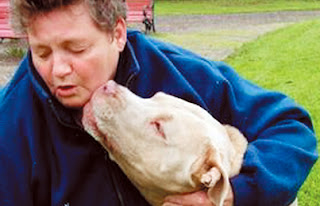Kanab, Utah — A quick survey of Georgia, a caramel-colored pit bull mix with cropped ears and soulful brown eyes, offers a road map to a difficult life. Her tongue juts from the left side of her mouth because her jaw, once broken, healed at an awkward angle. Her tail zigzags.
Scars from puncture wounds on her face, legs and torso reveal that she was a fighter. Her misshapen, dangling teats show that she may have been such a successful, vicious competitor that she was forcibly bred, her new handlers suspect, again and again.
Garrett Davis/New York Times |
A pit bull named Georgia does her best to grab a ball. All her teeth were pried out when she was owned by dogfighters, most likely to make certain she could not harm male dogs during forced breeding. The tooth-pulling caused excruciating pain, experts say.
|
Garrett Davis/New York Times |
Jeff Popowich, an animal care adviser at the Best Friends Animal Society Sanctuary in Kanab, Utah, gets a kiss from Lucas, one of the 47 dogs seized from the Vick property.
|
|
But there is one haunting sign that Georgia may have endured more abuse than any of the 47 surviving pit bulls seized last April from the property of suspended Atlanta Falcons quarterback Michael Vick in connection with an illegal dogfighting ring.
Georgia has no teeth. All 42 of them were pried from her mouth, most likely to make certain she could not harm male dogs during forced breeding.
Her caregivers here at the Best Friends Animal Society sanctuary, the new home for 22 of Vick's former dogs, are less concerned with her physical wounds than her emotional ones. They wonder why she barks incessantly at her doghouse and what makes her roll her toys so obsessively that her nose is rubbed raw.
"I'm worried most about Georgia," said the Best Friends veterinarian Dr. Frank McMillan, an expert on the emotional health of animals, who edited the textbook "Mental Health and Well-Being in Animals." "You don't have the luxury of asking her, or any of these animals: 'What happened to you in your past life? How can we stop you from hurting?'
"So here we are left with figuring out how to bring joy to her life," he said of Georgia, known to lick the face of anyone who comes near. "We want to offset the unpleasant memories that dwell in her brain."
Vick, once the highest-paid player in the NFL, is serving a 23-month sentence in a federal prison in Leavenworth, Kan., for bankrolling his Bad Newz Kennels dogfighting operation and helping execute dogs that were not good fighters. Dogs were electrocuted, hanged, drowned, shot or slammed to the ground, according to court records. Two mass graves with the remains of eight pit bulls were found on Vick's property in rural Virginia.
Pit bulls seized from illegal fighting operations are usually euthanized after becoming property of the government. The Humane Society of the United States and People for the Ethical Treatment of Animals recommended that Vick's dogs be euthanized, but many animal rescue organizations urged the prosecutors to let the dogs live.
The government agreed to give them a second chance after Vick agreed to pay $928,073 for evaluation and care of all the dogs. They were seen by animal experts, who named the dogs, and were eventually dispersed to eight rescue organizations for adoption, rehabilitation or lifetime care in sanctuaries, where they have been neutered. Only one of Vick's dogs was euthanized for aggression against people.
Best Friends, which is caring for more dogs than any other organization, received about $389,000. Many of their dogs are expected to be adopted after they are rehabilitated and matched with the right families. Vick's 25 other dogs are in foster care all over the country.
Abused, now pampered
Life at Best Friends is nothing like it was at Vick's property on Moonlight Road in Smithfield, Va., where many of the dogs were found chained to buried car axles. They slept on concrete. Their water, if any, was kept in algae-covered bowls. Most were underfed. Some showed recent lacerations.
Here, they live in a 3,700-acre sanctuary that is covered by juniper trees and sagebrush, and surrounded by canyons and red-rock formations. They have food called Canine Caviar, squeaky toys, fluffy beds and four full-time caregivers. The caregiver on the night shift curls up with the dogs for naps.
They are assigned to an area of the sanctuary called Dogtown Heights, what Best Friends calls a gated community. Vick's dogs have their own building with heated floors, sound-absorbing barriers and skylights. Each has an individual dog run because, for now, the dogs must remain isolated, for safety's sake.
Little Red is a tiny rust-colored female whose teeth were filed, likely because she was bait for the Bad Newz fighters. Handlers cannot explain why loud noises make her jumpy.
Cherry, a black-and-white male, has what seem to be chemical burns on his back. His file at Best Friends says he loves car rides and hind rubs. But like many of Vick's pit bulls, he is petrified of new situations and new people.
Oscar cowers in the corner of his run when strangers arrive. Shadow runs in circles. Black Bear pants so heavily that he seems on the verge of hyperventilation.
Vick paid $18,275 for the lifetime care of each of his dogs here but one. Denzel was deemed highly adoptable, so his fee was only $5,000.
Bred to be friendly
John Garcia, the assistant dog care manager of Dogtown, which houses about 500 dogs, said pit bulls that are withdrawn or aggressive toward humans break his heart because they are bred to be people-friendly. "With most of these dogs ... their actions are based on fear," said Garcia, who communicates with the dogs in soothing baby talk. "The biggest job we have with these guys is teaching them that it's OK to trust people. It may take months or years, but we're very stubborn. We won't give up on them."
Because the dogs are still adjusting to their surroundings, it is difficult to predict how many of them will become adoptable. They arrived Jan. 2 from Richmond on a chartered airplane, stressed after eight months in shelters. In initial evaluations last September, many lay flat and looked frightened. Now, many respond to caregivers by wagging their tails and giving sloppy kisses.
"They have improved by light-years," Garcia said, adding that it would take patience and a lot of time for these dogs to be happy and safe in an adoptive home.
Caregivers walk the dogs several times a day and spend time in their kennels, praising and caressing them. It is progress when a dog like Cherry does not need to be carried, because he is afraid to walk on a leash. It is monumental when Shadow approaches them without retreating.
Coping with trauma
Whether Georgia will find happiness is a big question. McMillan said she exhibited behavior that might be trauma coping mechanisms.
Georgia gnaws on her doghouse. She flipped her bed over so much that her handlers removed it. When toys are around, she often ignores people. Georgia, who was called Jane at Bad Newz Kennels, was sold to Vick in 2001 to help start his dogfighting business. She is thought to be his oldest dog, but her handlers can only guess that she is about 7. Dogs' ages are usually estimated by examining their teeth, but she has none.
Having those teeth extracted, McMillan and other vets said, must have been excruciating. Even with medication, dogs are in pain after losing one tooth, which may take more than an hour of digging, prying and leveling to pull.
"These dogs have been beaten and starved and tortured, and they have every reason not to trust us," John Garcia said as Georgia crawled onto his lap, melted into him for an afternoon nap and began to snore. "But deep down, they love us and still want to be with us. It is amazing how resilient they are."
































